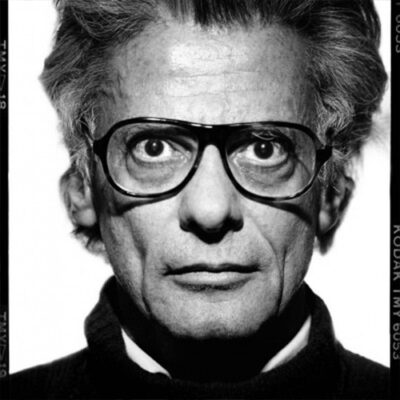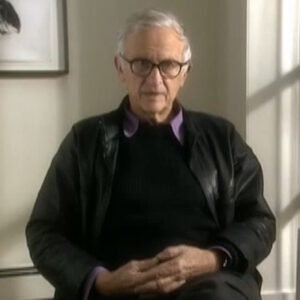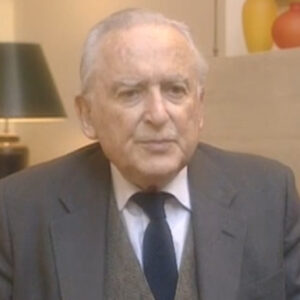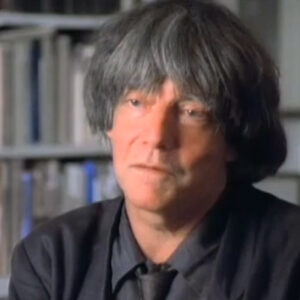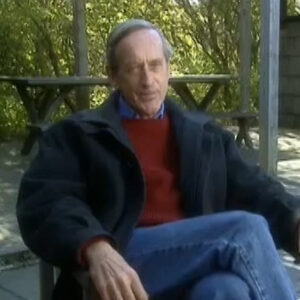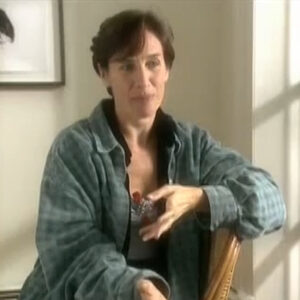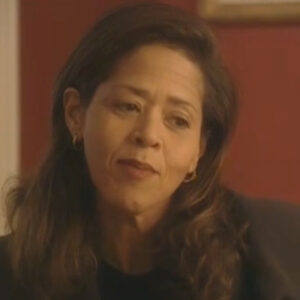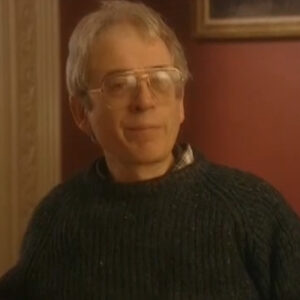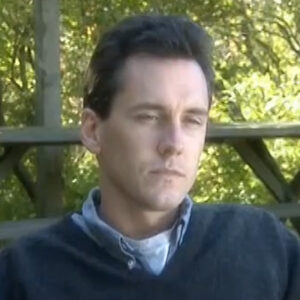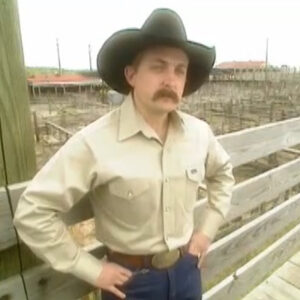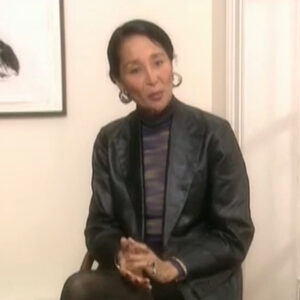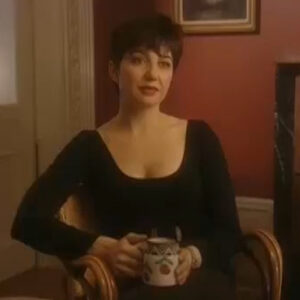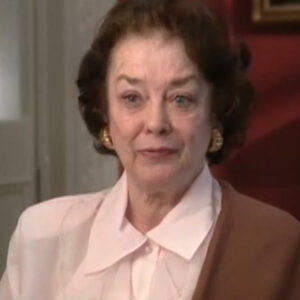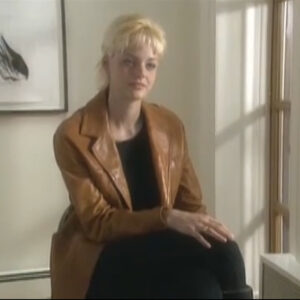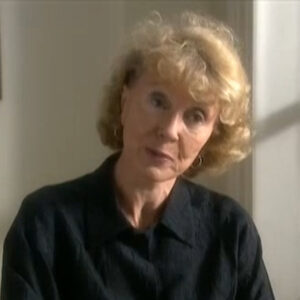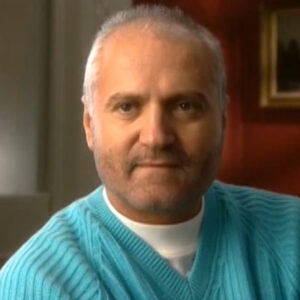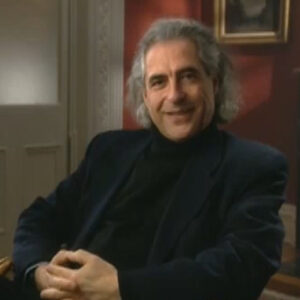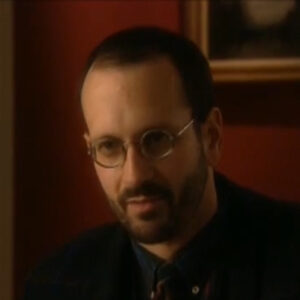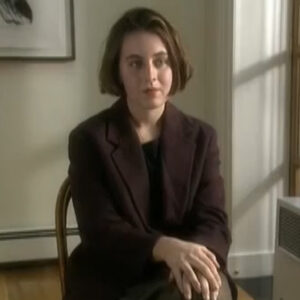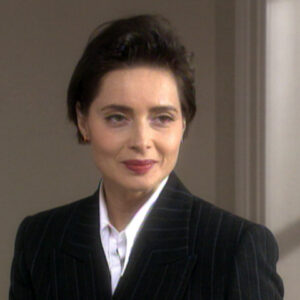Speaker It was like it was a real hothouse. Very tense. I mean, the air was crackling in that all white studio where. We all we all like to expose ourselves. And I would say that in general, Dick was very compassionate, but he was also a compassionate man, that he was extremely honest and and surgical in his criticism of all of us. And, you know, for better or for worse, we all had to swallow it. And it started. You’ve got the class off to, you know, very jet propelled start work.
Speaker You tell a story.
Speaker Well, I know for me personally, I was doing this because I would just mention I was doing this work on twins and I had spent a couple of couple of sessions out of Twinsburg, Ohio, and I felt pretty proud of these these photographs. I thought they were getting somewhere. I mean, my work was up on the wall. All of our work was up on the walls. My work was up. And I went through each one of them and he stopped demise as well. You know, this guy just looks like Annie Liebowitz. And I was crushed because I didn’t really know I did. I had no respect for her work. And so I realized that, OK, maybe it does look like or even if it doesn’t look that much like it. There’s there’s a parentage back to her work where there is a. Affinity to her work. I wasn’t willing to recognize, and so I had to.
Speaker With that, I was chosen because your phrase curable in a certain way. Talk about.
Speaker I think that I think this is really is first of all, I think he’s someone who believes in the 20th century phenomenon of psychotherapy and and that whole revolution that took place intellectually. I think that I come from a generation that’s suffered from the fallacies of believing in that too too indiscriminately. However, I think that for me that that there is photography can serve some of those opening functions into the psyche and becoming whole as a person. And I think Dick saw me as someone who could benefit from that through through the method of working as a photographer, taking on my brother as a subject. Taking on myself and my brother as a subject in order to make my twins book work and a richer way.
Speaker What did you think was lacking emotional level?
Speaker Just that I think he thought that the emotional contact either between the twins themselves or between me was was not it’s not happening. They were pinups. They were cardboard. They’re were very two dimensional. And they needed to have some life present to them, which is something I’m still struggling with. Dick has is capable on his own, in his own portraiture to do that, even with the constraints of a large camera. I adore that. And that’s why I picked him as my teacher, too. He’s the only person I know who can do it.
Speaker We talked to an actor along who got to know him very well.
Speaker And he’s going to be interviewed. And this may be the star my brother tells you a lot about Peter. Have any.
Speaker And he said that he felt that Dick was fascinated with the dark side. He believes it’s good to explore the dark side. It’s good to talk graphy. Just good therapeutically. What does he mean? What does. What does he mean by that?
Speaker The shadow. It’s interesting as you see it.
Speaker Well, what does he. I see I don’t hear him speaking that much about it.
Speaker I see it in his edits, though, seeing it as my work, for instance.
Speaker I see like today he looked at a photograph and said, this is something’s happening here. It was basically a photograph about Beest reality. And that’s the dark side. And this was a picture of a young girl with a dog that looked like it was about to mount her. And I think that’s part of it. The subterranean, like unconscious world is. So something that he would like to have better access to. I think certainly in his own work, he’d like to have better access to it or at least see it in others work. I mean, I think he feeds from that. I think he’s it’s it’s fulfilling. You know, it’s satisfying. He has an appetite for it.
Speaker When you see this, you’re looking at a number of the photographs, other people.
Speaker And when they begin to get the edge of that, getting excited by it and definitely talk about that.
Speaker Steve, I got Steve’s work. Is about is really the under is the underworld and the beauty in the underworld. It’s men. The last work that we saw of his was men making love and in sex, not really in very underground circumstances. In the city and very shadowy. Lots of movement. Mysterious but very palpable to at the same time, you could feel skin, you could feel sweat. You could feel that. But there’s no flash. It wasn’t, you know, graphic and explicable that was much more suggestive and beautiful as a result of that.
Speaker Trying to think here.
Speaker In terms of freeing me up personally, there was at one point what we’re talking about, Aegon Sheila, and about doing self portraits because he thought it was a self-portrait.
Speaker It was a really good vehicle for me to learn more about myself and learn more about what I want to do as a photographer. And we looked at Sheila and take it been greatly influenced by Sheila, the angularity, the graphic quality, the white background as some kind of strange void or status, strange proscenium from right in front of which this theater was going on Sheila’s psyche.
Speaker But he he was very dissatisfied with one of Sheila’s pictures of Sheila in prison masturbating. And he put that up. He threw that out to me as something to try and rectify you to make a better picture, make a real picture, because Sheila’s expression is not it’s not in keeping with the act. You know, it’s a very self-conscious.
Speaker So I would I would consider that part of the dark side, maybe not dark, but just a tad seemingly taboo area, too, to most photographic expression.
Speaker So specifically, I do what?
Speaker He only suggested that that was maybe something that was maybe a photograph for either him to take. And then he threw it back to me and said, oh, no, Mark should take that to himself. So it was a little bit of a dare, I guess, but I trust him when he does things like that.
Speaker You know, it’s it’s shocking at first. You know, I think the class was shocked when that when that came out. But I think there’s a kind of there’s a kind of perverse or divine wisdom that’s operating there. And you have to sort of follow, follow, follow the line down, follow the road down into the underworld and see if you can send your way out.
Speaker You take this. I did. Yeah.
Speaker I did. I did take that. I haven’t shared with the class. I’ve only shown Dick and thinking about I was going to show it this time, but I decided that I really could do a better picture, so I had to try and do a better picture.
Speaker Do you learn anything from the taking of that?
Speaker Yeah, I learned it was like I might need a collaborator to work on it with me. And also it was possible for me to take that picture. Which was kind of it was a child.
Speaker It was certainly a challenge. So it’s one of those things where.
Speaker You know, taking a picture like that of yourself, you could take just about any picture.
Speaker It frees you up policy to go forward because there are always those impulse. There are strange impulses that go through your mind working, and sometimes those are the best ones and maybe you don’t hate them because you are censoring yourself in some way or another. Something’s operating against you. Which which confuses you. And.
Speaker I mean, I, I, I brought pictures of a young girl here that some people would consider maybe poor verging on pornography, child pornography. But to me, they’re not at all. But I know that there are times when I hesitate in an exercise like what Dick gave me to work with. It’s the kind that frees you up.
Speaker You mentioned that you thought that one of the reasons that they might have some of the reasons, some practical, professional, perhaps even a better word, spiritual or the reasons it took, might be taking the time to teach this class at this point in his life. It’s been a while since he’s been teaching. Is that his. Thinking about a legacy. Passing on words. Talk a little bit about that, think at this point. Like the various impulses.
Speaker Well, there is the legacy of his work, but Dick is is he he you know, he adores people and he adores family. And we are like in a kind of extended family for him.
Speaker And we’re, you know, flesh and blood, which is not like books on the right, you know, on on the wall in the library. So I think it’s I think he wanted I I think he’s wanted to share something of what he’s learned through phenomenal volumes of experience working. He’s wanted to share that with others. And I think at this point in his life, it seems particularly. You know, apropos because of. Feeling that groping a little bit with his own work, feeling that maybe this commercial work, he’s always trying to reinvent himself commercially, but there’s there’s a certain degree of frustration there that he’s experienced in. Certain sense of futility to that, you know. Can I ever do anything more as a commercial photographer that’s meaningful to me? So this is definitely meaningful to him.
Speaker You would just take that away? The report isn’t clear. This is coming to the right place.
Speaker OK.
Speaker I think. Yes, teaching teaching definitely satisfies a need.
Speaker He has to touch, touch the heart and touch the world.
Speaker And.
Speaker Share his vision other than through the printed page. Share his insights. He’s incredibly articulate. And, you know, pictures, the pictures don’t have I don’t have audio with them. I mean, they’re just they’re they’re very 2D and very, very mute, which is part of their power.
Speaker But also, he is a person of of of of the word, definitely. So this is a way for him to pass that side of his being on.
Speaker Bring us in touch with also all those good things that are part of his life.
Speaker Respect. I’ll be at this camp controversy as well. And respect, same incredible variety of friends, beloved ones as well. There still is a sense of sadness creeping in coming up here. Parts of the Thin Morton realized that the class might be.
Speaker Well, we most of the time, we’re fairly dutiful and fairly obedient and in some ways like the ideal children, because we do. We’ve come to him because we respect him. He hasn’t always been the case for him. And but nonetheless, I think.
Speaker You know, there’s there’s a certain degree there’s a certain conceit and fallacy to the whole structure of our of his being a teacher and our being the students and the. Very transitory nature of that we unfortunately don’t get to spend as much time with him, I think, as we’d like to. You know, it’s it’s very it’s often very rash. And I think that’s that’s hard on him and hard on us, too. It does create try to create a sense of failure.
Speaker Yeah, Cuppy operates on his own, just like what you were saying. Yeah.
Speaker Now he’s gone through a lot lately.
Speaker A wonderful quote about his style as a teacher. Quite vivid and even more American. He said he has a rather like he looks like a bird of prey. You can swoop down and pluck your eyes out if you weren’t ready, but it means that you got a whole new set of eyes.
Speaker Yes. Well, you just stick with it because a teacher.
Speaker Well, he’s very, very easy. I mean, all you have to do is look at him and you can see that his eyes are are like twice the size. His pupils are twice the size of of most of us. And they see right through you and beyond you. And they see, you know, like centuries ahead and centuries behind.
Speaker And he’s a great hunter.
Speaker I mean, it’s strange when you if you look him deeply in the eyes, he’s I always feel like he’s looking at something other than the surface of your face. He’s looking either into your soul. He’s looking at you in the context of all of the rest of his work, which is a collective portrait of a time and place. He’s also like something is coming out of you at the same time. He’s drawing something out of you because there is this kind of porousness to his eyes, too. They’d like to bring you into them.
Speaker And they’re they’re very they’re very mysterious and poignant at the same time, not necessarily inviting. It’s like an encounter with a light.
Speaker It’s like, yeah, it was some kind of a god. It seems at times it’s clairvoyant medium.
Speaker And it’s it’s frightening at times, you know, that you know, that he sees through and, you know, he sees through into something into something else.
Speaker And that’s not always a pleasant sensation.
Speaker You can’t hide.
Speaker One of them, Stephanie Seymour. Okay. Do you remember could you just describe the making of that image from your own response to that image? And the classic response from.
Speaker Dick Dick wanted to do a supreme performance for us. That would be his ambition is always.
Speaker It’s always grand. So he wanted to be able to take a great picture in front of us. It was. Was very it it was kind of going to be once a didactic process, we’re going to learn from watching him at work and we were gonna follow it through the whole procedure of the edit and into the printed page. And he had chosen Stephanie Seymour, who is his current muse. And he worked in a very strategic way, which I was I had never seen anyone work that way myself when I work. It’s always it’s. It’s it’s much less. I get strewed strategic is the word, OK?
Speaker Some people were like it almost seemed like some people were pitted against each other so that they could get out of the scene quick enough so he could get to the real picture. He wanted to make and that would require a sequence of of three other pictures that were in some ways not failures, but they proceed.
Speaker They allowed him to proceed towards the ultimate picture, which was a portrait of Stephanie as the the emancipated knight woman of the 90s.
Speaker And in order to do that, she was highly styled by Polly Mitchell and his collaborator of many years. And the gesture he had chosen was for her to pull up, pull up this cross buyers, come take our song, very sheer dress and show her crotch as if to say, well, you can take it or leave it.
Speaker This was for Dick, an image of empowerment. And but some of us were not convinced. I think I was one of them. I know I was one of them. And I think there are other women in the class. I know there are other women in the class who were not convinced either.
Speaker And I was I felt that she felt that her her her the gesture was maybe a strong one. Definitely a strong one. But that her face was too frozen and wasn’t empowered looking. She looked like a caste mask, like a frozen mask of of of of a very conventional beauty from Condé Nast. She didn’t have that feeling of she wasn’t generating or radiating or communicating that feeling of empowerment. Since then, there’s pictures that he’s done of her which are a lot stronger, where you feel her as a person coming out.
Speaker And that’s great. He’s made. He’s made he’s made strides, great strides ahead with this.

